Mozambique: Chapo calls for coordinated action against organized crime
Mozambique: Curfew extended to all provincial capitals – AIM report
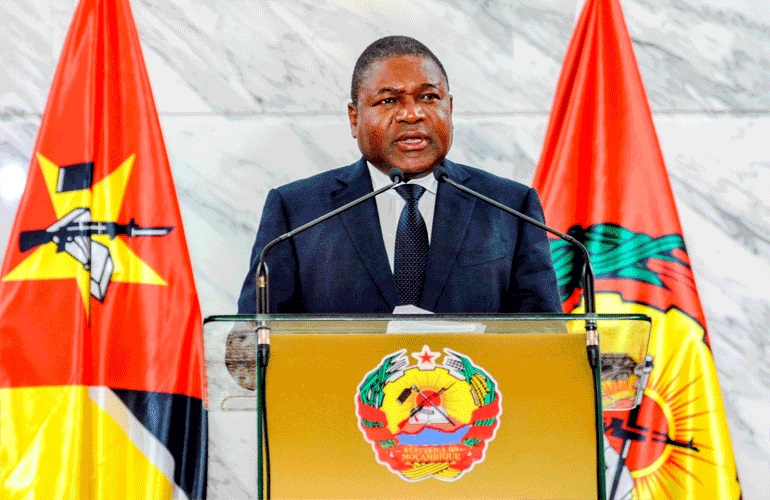
Photo: Noticias
Mozambican President Filipe Nyusi on Monday night announced that the curfew in place since February in the Greater Maputo Metropolitan Area (Maputo and Matola cities and Boane and Marracuene districts), as a measure to combat the spread of the Covid-19 respiratory disease, will now be extended to all the other nine provincial capitals (Xai-Xai, Inhambane, Beira, Chimoio, Tete, Quelimane, Nampula, Pemba and Lichinga).
Several of these cities – notably Nampula, Beira and Quelimane – have seen a sharp rise in Covid-19 cases in recent weeks.
Addressing the nation, Nyusi said the curfew will be shortened by an hour. The curfew will begin at 22.00 rather than 21.00, and, as before, will last until 04.00 the following morning. However, the government clearly rejected the advice from employers, represented in the Confederation of Mozambican Business Associations (CTA) who had suggested starting the curfew at 23.00.
Nyusi said this relaxation is to allow more time for workers in shops and restaurants, and university students attending night classes, to return home before the curfew begins.
Nyusi stressed that all other restrictive measures introduced to fight against Covid-19 will remain in place.
Thus restrictions on the sale of alcoholic drinks remain in force. All bars, and all stalls or kiosks whose main business is the sale of alcohol remain closed. Licensed bottle stores, shops and supermarkets may sell alcohol between 08.00 and 13.00 Monday to Saturday, but all sales of alcohol are banned on Sundays.
Places of worship remain closed, and all religious services are suspended. So are political gatherings – and one consequence of this is that the ruling Frelimo Party has been unable to hold a scheduled meeting of its Central Committee.
Citizens must wear masks in all public places where there is a possibility of crowds gathering (such as bus stops, shops, supermarkets and banks).
A second wave of the pandemic began in Mozambique in January, said Nyusi. The second wave, he added, proved more intensive than the first, “with five times more cases, six times more hospitalisations and seven times more deaths”.
This deterioration was, in part, due to the spread of a new variant of the coronavírus that causes Covid-19, and is much more infectious than the original virus.
Nyusi warned that, despite the reduction in cases, hospitalisations and deaths in March, “the current epidemiological situation is more serious than that registered before the start of the second wave. Currently the number of active cases of Covid-19 is ten times higher than in the last week of December”.
The President said the restrictive measures taken by the government are not arbitrary, but based on such indicators as the percentage of intensive care beds occupied, the positivity rate (the percentage of people tested found to be carrying the coronavírus, and the available of Covid-19 tests, and of personal protective equipment for health workers.
He noted that in several countries attempts to open up the economy before bringing the second Covid-19 wave under control “has precipitated the early start of a third wave, still more intensive than the second”. This had forced those countries to adopt even more severe restrictive measures.
Nyusi justified the government’s February decision to reopen the schools to face-to-face teaching. But it was vital “to assess in the coming weeks the impact of the reopening of the schools, so that we can decide on the next steps to take”.
Despite the recent improvements, the President said, the possibility remains that the Mozambican epidemic may speed up again. The country thus needed “to consolidate the gains resulting from the measures currently under way”, in order to ensure that, when the economy reopens “it will be in a favourable epidemiological environment”.
“The investments we have made in recent months are slowly producing the effects we want”, added Nyusi. “We are aware of the sacrifices asked from all of us. The only solution is to persist without despondency, to persist without offering a truce to the pandemic. We cannot allow all the work done so far to be put at risk”.
The government, he stressed, will insist on full compliance with the Covid-19 prevention measures, “but we never want to demand from Mozambicans more than is necessary”.
The current measures are in force for a further 21 days, and Nyusi hoped that the next time he addresses the nation he would be able to announce relaxations.
“The more we respect the rules, the more securely can we return to living together more openly, and to an economy without the weight of these restrictions”, he concluded.
Nyusi regarded the current vaccination campaign as complementary to the Covid-19 prevention measures. The priority group for vaccination was health workers, all of whom should be fully vaccinated by mid-April.


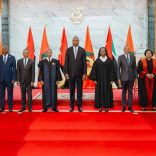

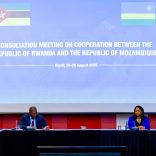
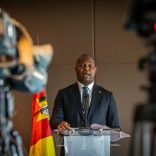

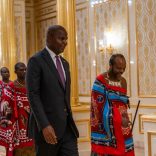




Leave a Reply
Be the First to Comment!
You must be logged in to post a comment.
You must be logged in to post a comment.